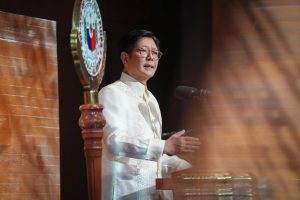Last week, Philippine President Ferdinand “Bongbong” Marcos Jr. linked the recent flooding disaster to the pervasive corruption in the government during his fourth State of the Nation address. Marcos mentioned several anomalous projects, such as overpriced laptops for schools, a bridge that took 10 years to build but was easily damaged, and train wagons purchased in 2014 that were never used.
But he devoted the last part of his speech to railing against corruption-tainted flood control projects. He blamed corruption for the intense flooding that submerged several parts of the country in July. He exposed faulty, substandard, and even non-existent flood control projects, which he found out during his monitoring of the situation on the ground.
He vowed to punish the corrupt contractors. “(We) shall examine (the) list of projects and give a report on those that have been failures, those that were not finished, and those that are alleged to be ghost projects,” he said in his speech.
Aside from publishing the list, he warned that he would not sign a budget bill that is not fully aligned with the government’s priorities, which indicated his rejection of the numerous insertions regularly made by legislators during the budget deliberations. These insertions are usually infrastructure items, including flood control projects, which are notorious for being a big source of corruption.
Ironically, the president’s anti-corruption remarks drew a loud cheer from legislators who are responsible for bloating the government budget with pork barrel programs.
Despite his strong push for accountability, Marcos failed to mention several key points that would fully explain the flooding and corruption crisis.
First, the flooding disaster should be probed in relation to the post-pandemic resurgence of mining, quarrying, dredging, and reclamation projects across the country. The president even suspended the reclamation of Manila Bay in 2023 because of concerns of flooding and environmental damage. During his speech, Marcos mentioned the garbage problem and the responsibility of citizens, but he did not cite the impact of extractive operations.
Second, the budget insertions made by Congress may be suspicious, but it is the president who has the biggest pork barrel allocation. His office controls the release of lump sum items, such as confidential funds, special purpose funds, and unprogrammed funds.
And third, he didn’t say a word about the impeachment case of Vice President Sara Duterte, who faces allegations of corruption linked to the dubious use of her confidential funds. Marcos could have underscored the value of the impeachment process in holding officials accountable, or he could have reiterated the call for greater transparency in government expenses, since many agencies have their own confidential funds.
His silence on the impeachment issue reflected his earlier pronouncements expressing misgivings over what he called a divisive political exercise. It may also be due to the fact that the impeachment trial could soon be nixed by the Senate after the Supreme Court ruled that the complaint is unconstitutional based on a procedural flaw.
Marcos’ silence on the looming dismissal of Duterte’s impeachment case undermines his rhetoric of combating corruption in the government. He wanted to appease disgruntled citizens reeling from floods and high prices, which led him to pin the blame on unscrupulous officials. But he could not take a bolder step to address impunity because it might be applied to his family members, who have yet to spend a day in prison for plundering the nation’s wealth when his father ruled the country as a dictator during the Martial Law era.
Marcos may address the skepticism over his anti-corruption stance by ensuring a more inclusive and transparent budget process. But in the end, the credibility of the anti-corruption campaign cannot be separated from the impeachment case of Duterte and the decision of the president to either retain or let go of his discretionary funds.
































